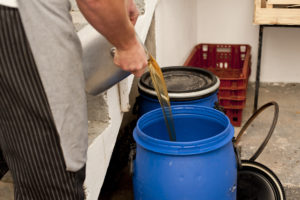In an era where environmental consciousness is paramount, adopting sustainable habits has become increasingly imperative for safeguarding the planet’s future. One often overlooked aspect of sustainability is the proper disposal of cooking oil. Instead of discarding it irresponsibly, recycling cooking oil presents a simple yet impactful solution to mitigate environmental harm. This article delves into the importance of recycling cooking oil and provides practical guidance on how individuals can incorporate this sustainable practice into their daily lives.
As we navigate the complexities of modern living, it is essential to prioritize sustainable habits that promote environmental stewardship. By embracing cooking oil recycling initiatives, individuals can make tangible contributions toward building a more sustainable and resilient future for generations to come.

The Environmental Impact of Improper Cooking Oil Disposal
Cooking oil is a staple ingredient in countless kitchens worldwide, but its improper disposal poses serious environmental threats. When poured down the drain, cooking oil can solidify and accumulate in sewage systems, leading to blockages and costly repairs. Additionally, it can contaminate waterways, harming aquatic ecosystems and wildlife.
Moreover, traditional methods of disposing of cooking oil, such as throwing it in the trash, contribute to landfill pollution. As cooking oil decomposes, it releases harmful greenhouse gases like methane, exacerbating climate change. Recognizing these environmental challenges underscores the importance of adopting sustainable practices to manage cooking oil waste effectively.
The Benefits of Recycling Cooking Oil
Recycling cooking oil offers numerous benefits for both the environment and society at large. By diverting used oil from landfills and waterways, recycling reduces pollution and conserves natural resources. Additionally, recycled cooking oil can be processed into biodiesel, a renewable fuel source that reduces dependence on fossil fuels and lowers greenhouse gas emissions.
Furthermore, recycling cooking oil supports local economies by creating opportunities for entrepreneurship and job creation. Many municipalities and businesses such as NJ Oil Recyclers offer recycling programs that collect used cooking oil for repurposing, contributing to a more circular economy and fostering community engagement in sustainability initiatives.
Practical Tips for Recycling Cooking Oil
Now that we understand the importance of recycling cooking oil, let’s explore some practical tips for incorporating this sustainable habit into our daily lives:
-
Collect Used Cooking Oil
Collecting used cooking oil is the first step towards sustainable disposal. Instead of pouring it down the drain, store it in a designated container such as a sealable jar or specialized recycling bin. This prevents oil from clogging pipes and polluting waterways, while also facilitating its proper recycling. By making it a habit to collect used cooking oil, individuals can take a proactive approach to reducing environmental impact and promoting a more sustainable lifestyle.
-
Filter the Oil
Before recycling, it’s essential to filter the used cooking oil. Strain it to remove any food particles or debris, ensuring it’s clean and ready for processing. Filtering the oil not only improves its quality but also reduces the risk of contamination during recycling. This simple step enhances the efficiency of the recycling process and contributes to a more sustainable approach to managing cooking oil waste.
-
Research Local Recycling Programs
Researching local recycling programs is crucial for the proper disposal of used cooking oil. Many municipalities and waste management companies such as NJ Oil Recyclers offer specific programs for collecting and recycling cooking oil. By researching available options in your area, you can find drop-off locations or scheduled collection events. Participating in these programs ensures that your used oil is recycled responsibly, reducing pollution and conserving resources. Stay informed about local initiatives to make a positive impact on the environment through sustainable waste management practices.
-
Participate in Community Initiatives
Engaging in community initiatives fosters collective action toward sustainable cooking oil disposal. Local organizations, schools, or environmental groups often organize events or drives to promote recycling. By participating in these initiatives, you contribute to a shared effort in reducing pollution and conserving resources. Whether it’s attending educational workshops or volunteering for collection drives, your involvement strengthens community awareness and commitment to sustainable practices.
-
Consider DIY Recycling
Consider DIY recycling as an alternative option for managing used cooking oil sustainably. Research methods for converting it into biodiesel or explore creative uses such as soap making or composting. DIY recycling allows you to repurpose oil in a way that benefits both the environment and your household. By taking matters into your own hands, you can minimize waste and contribute to a more circular economy. Embrace the opportunity to innovate and experiment with DIY recycling techniques at home.
-
Educate Others
Educating others about the importance of recycling cooking oil is vital for spreading awareness and inspiring action. Share information about the environmental impact of improper disposal and the benefits of recycling. Encourage friends, family, and peers to adopt sustainable habits by providing practical tips and resources. By raising awareness and promoting dialogue, you empower others to make informed choices and contribute to a healthier planet. Together, we can create a ripple effect of positive change through education and advocacy.

Leveraging Technology for Efficient Management
Leveraging technology for efficient management of cooking oil recycling involves the use of digital solutions to streamline collection, processing, and repurposing. Implementing smart sensors in collection bins can optimize waste pickup schedules, reducing transportation emissions and costs. Additionally, mobile applications can provide users with real-time information on nearby drop-off locations and recycling options. Blockchain technology offers transparent tracking of oil recycling processes, ensuring accountability and traceability throughout the supply chain. These technological innovations are used by cooking oil recycling programs, contributing to a more sustainable and environmentally friendly waste management system.
Conclusion
Incorporating sustainable practices into our daily lives is essential for mitigating environmental degradation and combating climate change. Recycling cooking oil is a simple yet impactful way to reduce pollution, conserve resources, and promote a circular economy. By following practical tips such as collecting used oil, researching local recycling programs such as NJ Oil Recyclers, and educating others, individuals can contribute to a healthier planet and create a more sustainable future for generations to come. Let’s embrace the power of recycling cooking oil and make a positive difference in our communities and beyond.



